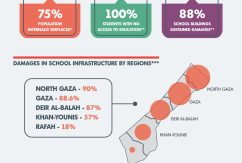No technician should stay at home
The project co-financed by the EU and the Swiss foundation Drosos and set up by IECD – the European Institute for Cooperation and Development – aims to help students from technical schools in Lebanon find a job in their field of specialization.
It’s 5:00 p.m. Carol Ojeil is about to leave her workplace. She has been working for several months now at Wood and Gas, a Lebanese chimney manufacturing company. “I’m very happy here. Especially since the work is stimulating and suitable for my training”, says the young girl who has a Technical Baccalaureate in interior design.
“I was contacted by Georges Makdessi, head of the referral office at Dekweneh Technical School, who offered me a job in this company. I didn’t have a resume with them. However, I was second in my class, which helped me quickly find my first job in a gallery. When I was offered this new position, which is better suited to my training and also in a well-known company, I immediately seized the opportunity”, she adds. Carol is the second person to be employed at Wood and Gas through this office.
Her brother, who studied architecture at the same school, hopes to quickly find a job through this office. He, on the other hand, has submitted his resume and is waiting to be contacted.
The office is a real godsend for technical school graduates. It greatly facilitates contact between companies looking for good people and graduates looking for a job in line with their specialisation.
The story began in 2012 when IECD, thanks to funding from the Swiss foundation Drosos, decided to set up a pilot project of the Guidance and Employment Offices (BOE) in 5 private technical schools. The European Training Foundation, through its project “Governance for employability in the Mediterranean – GEMM”, which aims to improve the employability of young people in the Mediterranean countries, has chosen to support the IECD pilot project by promoting the opening of guidance and employment offices in 6 public technical schools, a project co-financed by the EU. In particular, public schools in Dekweneh, Hammana, Choueifat, Bint Jbeil, Tripoli and Zgharta offer this service to their students.
“The aim is to help technical schools’ students choose their field of specialisation as soon as they enrol. Then, during their school years, they will be guided and prepared to find a job, through several activities. For this, the head of the referral office will use his/her network to find them a job when they graduate”, says Zeina Sfeir, a project manager at IECD.
The offices organize about fifteen activities divided into three categories. The first one is all about raising awareness among young people in academic schools and also among parents about technical education and the labour market’s high demand for technical professions.
“When a student turns 18, he or she will have a Technical Baccalaureate diploma and can easily find a job with a decent salary that will allow him or her to support himself or herself and become financially independent”, she says.
“The real challenge is with parents: changing the existing mentality and prejudices, especially the idea that students who go to technical schools are losers and good for nothing”, says Zeina Sfeir regrettably.
The second category focuses on guidance and counselling: ensuring that the student chooses the right course of study according to his or her interests and skills, but also according to job prospects, teaching him or her how to do a job search, write a CV, prepare for a job interview, visit companies, etc.
The third category covers placement and internship activities: creating and developing a network with companies to foster the placement of students and graduates, but also keeping in touch with alumni to strengthen the school-company relationship.
A lot of promising results
“Referral and employment offices have had a lot of success stories. Students have been able to find a job either directly through the office or indirectly through activities organized by the offices that facilitated their access to companies”, adds Zeina Sfeir. According to her, the labour market is fond of technicians. For each engineer, companies request for ten technicians.
At the same time, the project has led to the creation of new positions of head of referral and employment offices.
This is the case of Georges Makdessi. He is the head of the office at the Dekweneh School of Arts and Crafts. Founded in 1905, it is one of the oldest technical schools in Lebanon. It has the specific feature of being located close to an industrial area, north of Beirut, but also within immediate vicinity of Mount Lebanon.
After an intensive training, Mr Makdessi, who had taught electricity for 12 years, took over the guidance and counselling office that had just been set up by decree of the then Minister of Education, Elias Bou Saab.
It must be said in this context that the EU lent its full weight by supporting GEMM in the field, to convince the Lebanese State to join the project.
“I contacted approx. 110 renowned companies, which recruited through our office”, he explains.
“No technician should stay at home, because the job market is short of qualified technicians”, he asserts. In one year, the office succeeded in getting about 40 people hired, a significant figure in a country in crisis.
“Through our statistics on the need of the market we recommend different diplomas sought by companies, by guiding the students. This is the case here in Dekweneh for industrial engineering studies. A few years ago, only three students graduated. Today, there are about 20 of them”, explains Makdessi.
What could be more gratifying for the EU, which is eager to give young people the opportunity to work in their country in order to have a decent and productive life? This will also prevent them from being tempted to migrate or fall into the trap of radicalism or criminal networks.



































